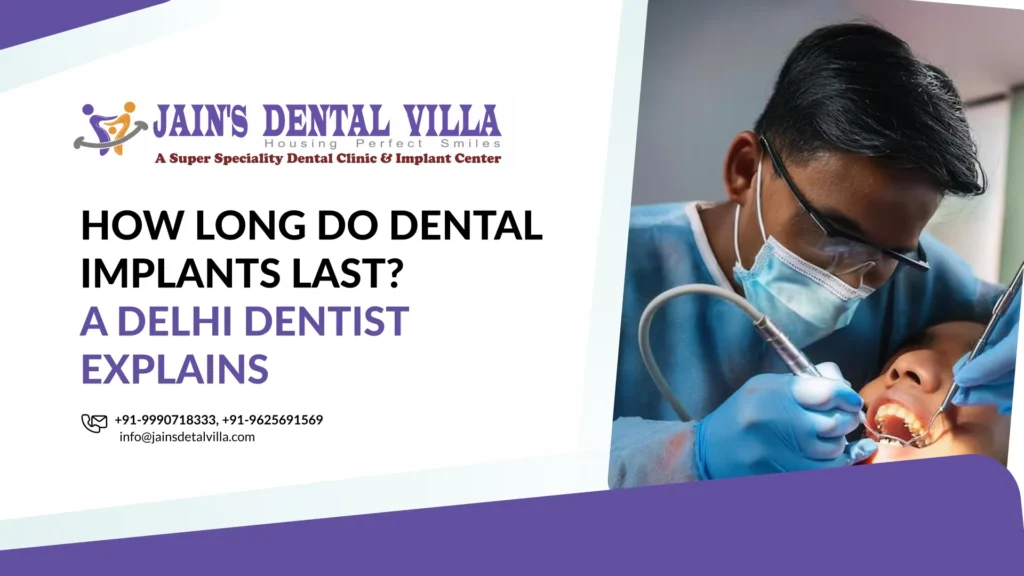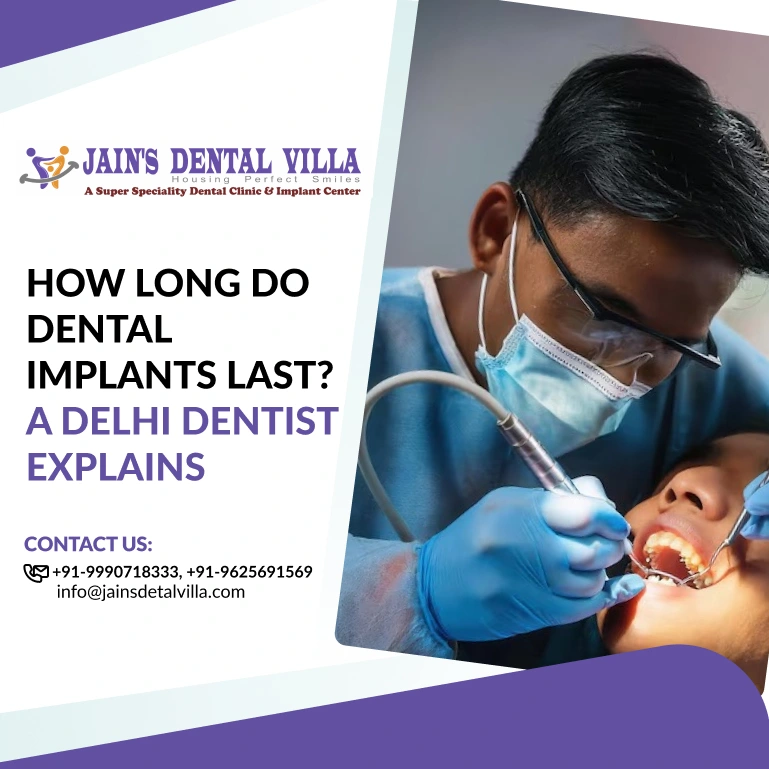A dental implant is a small, strong Titanium alloy screw. It is utilized while replacing teeth that are missing or damaged. It is fixed into the jawbone so that the screw can securely join the artificial teeth to the jaw.
Apart from damaged or missing teeth, implants can also be used to support loose artificial teeth. Visiting an experienced dental implant clinic in Ashok Vihar ensures that every step of the dental implant procedure is done with precision and long-term stability in mind.

What are dental implants and how do they function
Parts of a Dental Implant: The three main components of a dental implant are the implant fixture, the abutment, and the implant crown. Implant fixtures and abutments are usually made of metal, whereas crowns can be made of a variety of materials.
The implant fixture is a metal rod which is in the shape of a screw. It is fixed into the jawbone to function as a substitute for the tooth root and is usually made of Titanium or Zirconia.
The abutment is a tiny connector piece that is attached to the implant fixture. It offers a base for the implant crown to be placed on and is generally made of Titanium or Zirconia.
The implant crown is the part of the dental implant that can be seen. Crowns can be used to replace single teeth and can be made of metal or porcelain fused to metal. Dentists at Jain’s Dental Villa, a reputed dental implant clinic in Ashok Vihar, can help you choose the right crown material based on appearance, function and dental implant cost.
How Dental Implants Integrate with the Jawbone: Dental implants are usually made of Titanium alloys. The method by which a dental implant integrates or fuses with the jawbone is called osseointegration. A solid base for the placement of the dental implant is provided by the jawbone, which forms around it.
Types of Dental Implants: The three main types of dental implants are endosteal, subperiosteal, and zygomatic. Experienced specialists at Jain’s Dental Villa, a dental implant clinic in Ashok Vihar, will evaluate your bone structure to determine which implant type and dental implant procedure are best suited to your needs.
Average lifespan of dental implants
How Long Do Dental Implants Generally Last
Dental implants are meant to be permanent. This is because they integrate directly with the jawbone, fusing with the neighbouring bone tissue. An implant is made to be permanent. But the crown fixed to it may require replacement because of wear and tear. Most often, crowns need to be replaced after 15-20 years.
Lifespan of Crown vs Implant Post
Crowns may need to be replaced after 15-20 years because of wear and tear. The implant post is durable because it fuses directly with the jawbone. However, the crown, which is the visible part of the dental implant, can undergo wear and tear over a period of time.
Why do Crowns Undergo Wear and Tear?
Crowns are impacted by chewing and biting over a long period of time. They usually last 15-20 years. Teeth grinding can also weaken crowns. This can occur during sleep, and the pressure exerted causes the crown to crack. Habits such as biting fingernails and objects like pens can also cause damage to crowns.
Factors that influence how long dental implants last
Oral Hygiene and Post-Operative Care
The habits and practices you follow after the installation of dental implants are known as aftercare. It is more than a list of guidelines; it is your dedication to ensuring the durability of your dental implants. Correct aftercare is important for multiple reasons. It assists in promoting recovery in the jawbone and neighbouring tissues, which are critical for the stability of the implant. The correct care decreases the threat of complications that can result in failures. It is important to brush twice a day and floss regularly. If you have undergone a dental implant procedure at Jain’s Dental Villa, a dental implant clinic in Ashok Vihar, follow your dentist’s aftercare plan closely to ensure long-term success.
Lifestyle and Habits
Lifestyle habits have an important influence on the long-term effectiveness and durability of dental implants. Good oral hygiene habits like brushing twice a day, flossing regularly, and visiting the dentist regularly can help prevent gum disease. Smoking has a negative impact on dental implants. Chemicals such as nicotine affect blood flow to the gums and jawbone, thus raising the threat of infection and implant failure.
Bone Health and Gum Condition
The jawbone functions as the base for dental implants. A strong and healthy jawbone helps in holding the implant securely. The threat of failure is raised if the jawbone is weak. Although implants are made of strong materials such as Titanium, the tissues that support them can be affected by bacterial infections. Gum disease can damage the bone and soft tissue surrounding the implant. This reduces the stability of the implant and, in certain circumstances, can result in implant failure.
How to increase the life of your dental implants
Regular Visits to the Dentist
At Jain’s Dental Villa, Dr Jain has plenty of experience in the installation of dental implants. He makes use of the latest technology and methods to design a customized treatment plan that will result in an implant that can withstand the effects of chewing and other mechanical forces. Visit the clinic once every six months. Regular teeth cleaning and oral examination will ensure the durability of dental implants.
Proper Cleaning and Maintenance Routine
Use a soft-bristled toothbrush and a non-abrasive toothpaste to clean your teeth. Flossing can help get rid of food particles and plaque surrounding the implants. Teeth grinding during sleep can also cause wear and tear of dental implants. Wearing a night guard can help prevent damage due to teeth grinding. Correct care of dental implants not only increases their lifespan but also protects your overall well-being.
Healthy Lifestyle Choices
A healthy lifestyle is crucial to increasing the lifespan of your implants. Making healthy decisions will improve your overall health while decreasing the odds of damage to your teeth. Avoid teeth grinding, smoking and chewing tobacco. Regular exercise helps boost the immune system, such as through activities like walking, running, and swimming. A better immune system ensures that your teeth and gums are not prone to infection.
Indications that your dental implant requires attention
Initial Indications
While some discomfort is common after getting a dental implant, continuous pain or discomfort that occurs quite some time after the recovery process could be an indication of an issue. If there is continuous pain near the implant site, it could be due to incorrect placement of the implant, loss of bone or inflammation of the gum tissue.
A successful dental implant should be stable like a natural tooth. If it is moving around, there is something wrong. This mobility could be due to bone loss near the implant, failure of fusion between the implant and jawbone, or mechanical issues related to the components of the implant. Difficulty in chewing, swelling of gums are other signs that your dental implant requires attention.
When to Visit Your Dentist Immediately?
If you observe that the pain is not getting better or continues to become worse about 1-2 weeks after your implant surgery, you should visit your dentist immediately for treatment. It is important to address these problems immediately to avoid further complications.
Reasons for Dental Implant Failure
Some of the common reasons for dental implant failure are wrong alignment of the implant, poorly taken impressions, infections, failed integration with the jawbone, damage to the nerves, and rejection of the body to a foreign object. Expert monitoring at Jain’s Dental Villa, a dental implant clinic in Ashok Vihar, can detect these issues early and prevent failure. Understanding the dental implant cost and the expertise involved helps patients appreciate the precision and care needed for lasting success.
Why choose jain’s dental villa for dental implants in ashok vihar
At Jain’s Dental Villa, we focus on delivering excellent dental implant services customized to your unique requirements. Our team couples years of experience with advanced technology to make sure that patients get the best possible treatment. We know that undergoing a dental implant procedure is an important decision, so we’re dedicated to offering compassionate care and support throughout the treatment.
Our dedication to constant learning and investment in modern dental technologies means that you can take advantage of the latest developments in implant dentistry. We utilize 3D imaging and computer-assisted implant placement methods to increase accuracy and reduce healing time. Our patient-centric approach makes sure you are comfortable and confident at every step of the process, with complete transparency about the dental implant cost and expected outcomes.
FAQs
Do dental implants ever require replacement?
Although dental implants are designed to last permanently, they may need to be replaced in cases of damage, infection, or lack of bone support.
Can implants last a lifetime?
The implant post is extremely durable and can last a lifetime. However, the crown can experience wear and tear. Crowns can also last very long if proper precautions are taken, such as maintaining good oral hygiene and scheduling regular dental checkups. Generally, crowns are replaced after 15-20 years.
How frequently should I visit my implant dentist?
You should visit your implant dentist twice a year. A full oral checkup and routine cleaning are recommended. Apart from these visits, it is important to maintain proper oral hygiene at home by brushing twice a day, flossing regularly and using a mouthwash.
How do dental implants compare to dentures and bridges?
Dental implants last longer than bridges. While bridges may need to be replaced after 5-7 years, dental implants can last as long as 15-20 years. But dental bridges are a less expensive option when compared to dental implants. Choosing between the two depends on the type of dental issue and the requirements of the patient.

